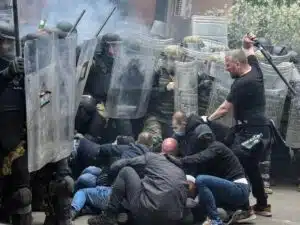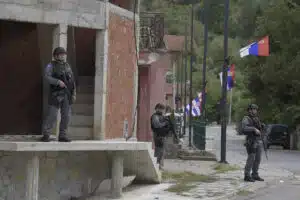Brussels – After months of “temporary and reversible” measures against Kosovo poorly justified by the European Commission for last year’s violence in the north of the country – while sanctions against Serbia, no less responsible for the same events, have remained a dead letter – now the EU institutions are called upon to seriously consider withdrawing them, given Pristina’s commitment to implement all steps required by the de-escalation plan outlined last summer by Brussels. “The Council will discuss the EU’s measures based on a report by the High Representative on the fulfillment of the Union’s demands,” said European External Action Service (EEAS) spokesman Peter Stano, commenting to Eunews on the next steps after early elections in the four municipalities in northern Kosovo at the center of a year-long diplomatic dispute that sparked the wave of violence between May and September.
Zubin Potok, Zvečan, Leposavić, and Kosovska Mitrovica are the four municipalities where early elections were held on Sunday (April 21) to repeat the contested April 2023 vote. So, as requested by the General Affairs Council on December 12, 2023, the government in Pristina made sure that the ethnic Serb component could participate “actively, without any preconditions.” However, just like in the spring of 2023, the major Serb-Kosovar party Lista Srpska decided to boycott the elections, leading to “several difficulties, including the establishment of some electoral commissions without any Kosovo Serb members,” Stano added, underlining Brussels’ accusation against Lista Srpska for having “lost the opportunity to exercise the right to vote and to elect truly representative mayors.” A result that, again, “does not help defuse tensions and paves the way for the return of Serbs to the institutions” of Kosovo, a step “essential for the normalization of relations” within the country and with neighboring Serbia (whose president, Aleksandar Vučić, indirectly controls Lista Srpska).
 At the same time, however, the EU institutions now have to deal with pressing demands from Pristina to withdraw the “temporary and reversible” measures imposed at the end of June 2023 due to Pristina’s failure to take a “constructive attitude” toward de-escalation of the tension that arose after the four mayors took office. These measures – which are currently in effect – involve suspension of the work of the bodies of the Stabilization and Association Agreement and bilateral visits (except for those of the Pristina-Belgrade dialogue), freezing the programming of funds for Kosovo under the IPA 2024 (Instrument for Pre-Accession Assistance) programming exercise and proposals submitted by Pristina under the Western Balkans Investment Framework (WBIF). A four-stage roadmap had been agreed on July 12 to remove these measures, including an early return to the polls in the four municipalities in the north of the country.
At the same time, however, the EU institutions now have to deal with pressing demands from Pristina to withdraw the “temporary and reversible” measures imposed at the end of June 2023 due to Pristina’s failure to take a “constructive attitude” toward de-escalation of the tension that arose after the four mayors took office. These measures – which are currently in effect – involve suspension of the work of the bodies of the Stabilization and Association Agreement and bilateral visits (except for those of the Pristina-Belgrade dialogue), freezing the programming of funds for Kosovo under the IPA 2024 (Instrument for Pre-Accession Assistance) programming exercise and proposals submitted by Pristina under the Western Balkans Investment Framework (WBIF). A four-stage roadmap had been agreed on July 12 to remove these measures, including an early return to the polls in the four municipalities in the north of the country.
“Kosovo has once again demonstrated maturity, exemplary organization, and full respect for its laws and Constitution by offering all communities, without distinction, the opportunity to choose their representatives,”Kosovo President Vjosa Osmani said, adding that ” Kosovo has met all the conditions required by the EU. The unjust measures against Kosovo must be lifted immediately.” In the same vein is the Prime Minister, Albin Kurti: “Each necessary step of the process to make the vote possible was undertaken by our government,” he made clear in a post on X, recalling not only that “even this vote was boycotted and the legal minimum threshold for the resignation of mayors was therefore not met,” but more importantly that “we have fulfilled our obligations.” At the moment, the EEAS spokesperson could not yet give precise indications as to when the EU High Representative, Josep Borrell, will present the report to the 27 EU ministers responsible for European Affairs, but – if it is before the June 6-9 elections – one should look out for the informal General Affairs Council on April 29-30 and the ordinary one on May 21.
Tensions between Kosovo and Serbia
It has been almost a year since the relationship between Serbia and Kosovo entered one of the most complex and violent phases since Pristina’s (unilateral) declaration of independence from Belgrade in February 2008. It was precisely because the newly elected mayors of Zubin Potok, Zvečan, Leposavić, and Kosovska Mitrovica took office (the same municipalities that returned to the polls last week) on May 26, 2023, that violent mass protests by extremist bangs of the Serb minority that became guerilla warfare on May 29, also involving soldiers of the NATO-led KFOR mission. Tensions broke out over the Albin Kurti government’s decision to send special police forces to allow mayors elected on April 23 to enter town halls in a controversial election round due to very low voter turnout.

Meanwhile, on June 14, there was the arrest/kidnapping of three Kosovar policemen by Serbian security services, with the respective law enforcement agencies of Pristina and Belgrade accusing each other of trespassing. Brussels convened an emergency meeting with PM Kurti and President Vučić to get out of “crisis management mode.” the three Kosovar policemen were finally released on June 22. However, due to Pristina‘s failure to take a “constructive attitude” to de-escalate the tension, Brussels imposed “temporary and reversible” measures against Kosovo in late June (still in place, despite the July 12 roadmap). The situation escalated again with the terrorist attack on September 24 near the Serbian Orthodox monastery in Banjska. On the day of clashes between the Kosovo Police and a group of about 30 gunmen, a policeman and three attackers were killed.
Developments in the attack showed clear branches in neighboring Serbia. Milan Radoičić, deputy head of Lista Srpska, a few days after the armed attack, confirmed he was among the bombers outside the monastery and Milorad Jevtić, a close associate of the Serbian president’s son, Danilo Vučić. To make matters worse, Serbia deployed troops along the administrative border, a move denounced by the United States. The threat did not materialize, but the EU began to reflect on the possibility of imposing the same measures in force against Pristina also against Belgrade. But to do so, it needs a unanimous green light in the Council, and Vučić’s closest ally inside the Union -Hungarian Premier Viktor Orbán – vetoed. As if that were not enough, before early elections in Serbia on December 17, the last act of the government led by Ana Brnabić was to send a letter to Brussels to warn that Serbian institutions do not recognize the legal value of the verbal commitments made in the context of the Pristina-Belgrade dialogue and that it will not recognize the de facto sovereignty of Kosovo.

The only positive news, at the moment, is the resolution of the ‘battle of the license plates’ between Serbia and Kosovo, thanks to the decision between late 2023 and early 2024 on mutual recognition for vehicles entering the border. Even given the unpromising assumptions on which the new year is being set. With the enactment of the Regulation on the Transparency and Stability of Financial Flows and Combating Money Laundering and Counterfeiting, as of February 1, the euro became the sole currency of exchange and deposit in bank accounts: the Serbian dinar can still be exchanged on par with the Albanian lek or the dollar, but the decision will have an impact on all those public services that never adjusted to Pristina’s adoption of the euro in 2002 (even before independence).
The move by special police on February 5 at offices of temporary institutions run by Serbia in four municipalities in northern Kosovo (Dragash, Pejë, Istog and Klinë) and at the headquarters of the NGO Center For Peace and Tolerance in Pristina raised controversy in Brussels: since 2008 Belgrade has continued to fund municipalities, businesses, public enterprises, kindergartens, schools, public universities, and hospitals at the disposal of the Serbian minority, illegally according to the Kosovo Constitution. All this while the process of Kosovo’s accession to the Council of Europe, which would constitute its Balkan country’s first entry into an international organization since the declaration of independence in 2008, proceeds – and now seems unstoppable despite Serbian opposition.
Find more insights on the Balkan region in the BarBalkans newsletter hosted by Eunews
English version by the Translation Service of Withub





![Mercato immobiliare [foto: imagoeconomica]](https://www.eunews.it/wp-content/uploads/2023/11/Imagoeconomica_1925354-e1699368704221.jpg.webp)


